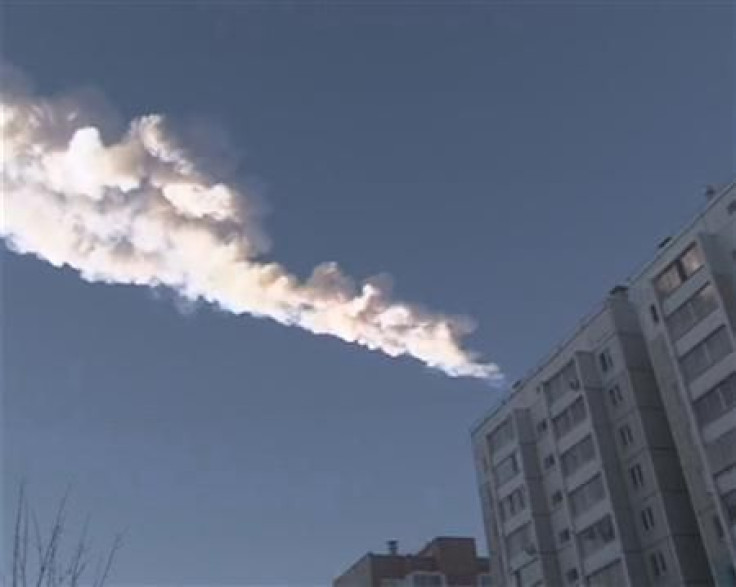Meteorite Hits Central Russia; Over 400 Injured, Nuclear Plant Safe (VIDEO)

A meteor burst above the Ural Mountains in central Russia on Friday, showering debris over the region and injuring more than 400 people, local media reported.
An amateur video telecast on Russian television showed an object speeding across the sky at about 9:20 a.m. local time (03:20 GMT), leaving a thick white contrail and an intense flash, the Associated Press reported. Eyewitness told local media that there was a loud thunder-like sound, which shook the ground. Flashes could be seen above the sky from hundreds of kilometers away.
Traces from the falling objects could be seen in Yekaterinburg, about 200km (125 miles) north of Chelyabinsk, a witness told Reuters.
Although no critical injuries were reported from the incident, people were wounded from shattered glasses and debris as the meteor explosion rattled houses and buildings, even bringing down some roofs in the Chelyabinsk region's Satka district, a spokesman for the Interior Ministry said. The region is located about 80 kilometers from the district's administrative center.
Fragments of the meteor fell over the region causing explosions, the Emergency Ministry said in a statement.
Offices in the city were being evacuated and schools were closed for the day across the region. A team of 20,000 rescuers was alerted following the incident, although the Emergency Ministry said they were not expecting any more meteor debris to fall from the sky.
However, there were conflicting reports on the incident as a spokeswoman for the Emergency Ministry, Irina Rossius, told the Associated Press that there was a meteor shower, but another ministry spokeswoman, Yelena Smirnikh, was quoted by the Interfax news agency as saying that it was a single meteorite. People in Chelyabinsk had initially speculated that the incident was a missile explosion or a jet crash, Voice of Russia reported.
"What happened over the Ural region was not a meteor shower, as was reported earlier. It was a meteorite, which burned up as it passed through the lower layers of the Earth's atmosphere. However, it triggered an impact wave, which smashed windows in several houses in the region," Yelena Smirnykh told Interfax.
Atomic Agency Operations Undisrupted
Russia’s state-run atomic agency, Rosatom, said there were no damage to the nuclear facilities in the region and all operations continued as usual. Mayak nuclear plant -- one of the largest nuclear facilities of Rosatom -- is located in the area that was hit by the meteorite.
“All facilities are working as usual. They haven’t been damaged by the meteorite strike,” a Rosatom source said.
However, Emergency Ministry officials said cellular services were disrupted for an hour after the meteor explosion.
The meteorite crash in Russia has happened at a time when many are watching for the newly discovered 2012 DA14 asteroid, which will come close to the Earth on Friday.
© Copyright IBTimes 2024. All rights reserved.












